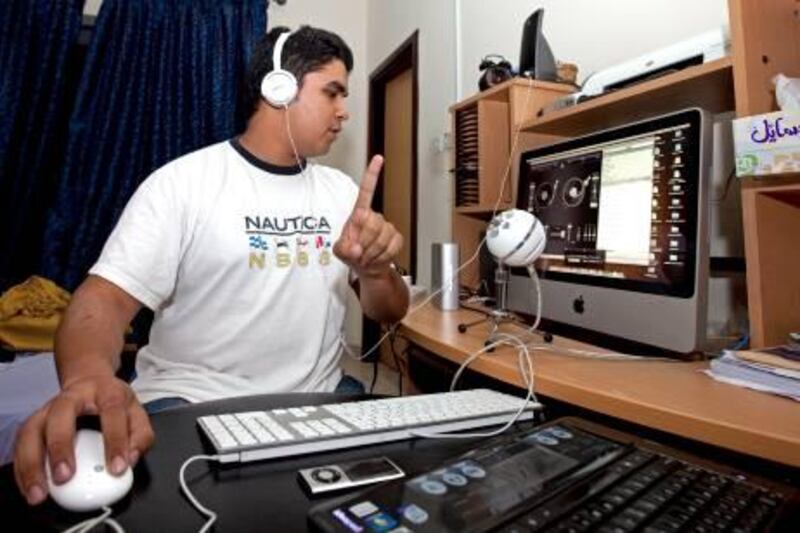SHARJAH // An online student radio station that started broadcasting from a converted bedroom just over a year ago is planning a major relaunch from a new studio after winning a contest for entrepreneurs.
Campus Radio Middle East beat out 500 other entrants to land first prize - worth Dh100,000 - in the Falcons' Lair competition run by Virtuzone, a Dubai company that helps business start-ups, and the online classified site Dubizzle.
MORE UAE NEWS: Our pick of today's top local news stories
Bouncing cheques should be decriminalised, say lawyers Legal experts want fines handed out by courts instead of a jail sentence. Read article
97% of retailers fall short in food and meat inspections Ninety-seven per cent of Dubai shops targeted by food control department issued with warnings or fined for failing to meet basic food hygiene standards. Read article
World's most expensive car heading for UAE Setting its mysterious owner back a cool $2.4 million, the Bugatti L'Or Blanc is the world's most expensive car. Read article
[ MORE UAE NEWS ]
The prize consisted of Dh50,000 from Virtuzone that set up the station as an official company and covered the first year's incorporation costs, and Dh50,000 in advertising from Dubizzle.
"It was a business pitch competition and we managed to win and are now in the process of getting ourselves a trade licence, and once that happens we'll be setting up a brand new studio," said Muhammed Ali Jamadar, who runs the station with Ritesh Jeswani.
"We're relaunching on a more serious level. We'll actually have a full set-up with a studio and office, I would imagine that everything will be up and running in the next three to four months."
In the meantime the station has moved back to the bedroom after a stint working from a youth centre at Dubai Festival City.
The Indian friends from Sharjah set up the venture while studying at Manipal University in Dubai, quickly attracting a team of 24 volunteers. While covering costs out of their own pockets, they were soon broadcasting seven live talk shows and five music shows a week - programming that has been temporarily suspended until the relaunch. In the meantime they are providing a 24/7 streaming music service.
"We've told all the volunteers and paid staff who work with us the plan and they're all on board," Mr Jamadar said. "We will bring back the old programmes because a lot of them were very popular, but we have a few new programmes lined up too."
In addition to starting an internship programme, the duo has plans to expand to other countries.
"We're already in talks with Qatar, and Oman isn't very far away," he said. "Hopefully in five or six years we'll have a better line-up of programmes and a full 24-hour schedule, because we've only been doing 7pm to 1am."
The station, which broadcasts primarily in English, has no plans to rethink this approach.
"We do have some Arabic content because it's an Arab country and we have a sense of Arab culture," Mr Jamadar said. "But we're trying to appeal to all students, regardless of whether they're Arab or Indian or South African or whatever, so we need to speak the language of all the students, and that's why English will continue to be our primary language."
The station's talk programmes have provided a valuable platform for students to discuss the issues that are most important to them.
"One of the interesting ones we tackled was student accommodation and how it is very scarce in the region unless you're going to a very big university," Mr Jamadar said. "The bigger government colleges have purpose-built accommodation, but with a lot of smaller private universities the dorms are far away from the university.
"Ideally your dorm should be within walking or cycling distance, but in some cases they are kilometres away. That is an issue because if you're a visiting student and you live in the dorms and you want to go to the university library to read up some files or do course work you can't because it's too far away. A lot of students can't afford a car."
Although Mr Jamadar, 23, has now graduated and works in marketing, he is determined to maintain his links with the radio station.
"At some point I'd like to hand over the day-to-day running, perhaps to a student and a full-time employee so the student gets the experience, but I'd still like to be involved."






